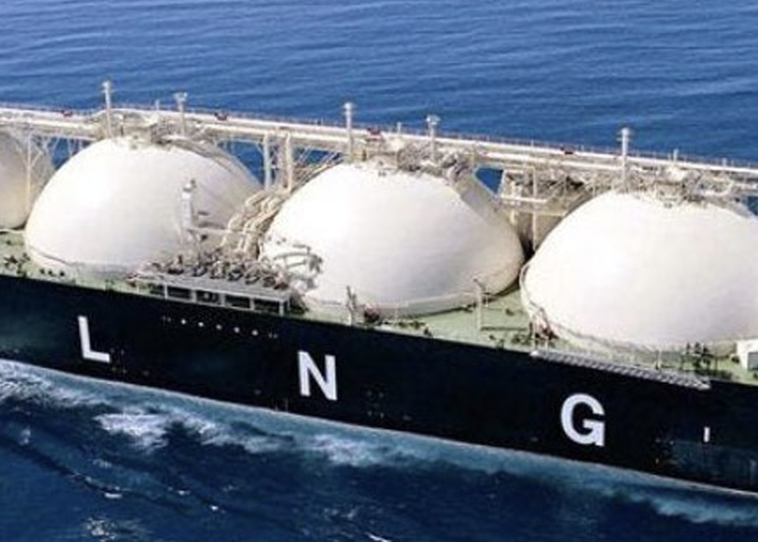TORONTO – Canadian banks are pouring billions of dollars into the global expansion of liquefied natural gas (LNG) terminals that could potentially unleash more than 10 gigatonnes of climate-wrecking greenhouse gas emissions, according to new research (1). The expansion of LNG depends on the support of banks and investors, with nine Canadian banks responsible for US$16.7 billion in support for expansion between 2021 and 2023 (2). Reclaim Finance and Greenpeace Canada warn that the emissions from these projects, which can be more damaging than coal, will breach net zero goals. They are urging banks to stop providing financial support to the developers of all new LNG projects, and to primarily stop financing export terminals.
LNG development is booming, with 156 new LNG terminals planned by 2030. Oil and gas companies such as ExxonMobil and TotalEnergies, alongside LNG specialists such as Venture Global LNG and Sempra plan to massively expand their operations, despite International Energy Agency (IEA) projections showing over-capacity for the sector (3).
These include 63 new export terminals, which could potentially unleash more than 10 gigatonnes of greenhouse gas emissions by the end of the decade (4). This is almost as much as the annual emissions of all the coal plants in operation worldwide (5) and will inflict dangerous levels of air pollution and health risks on local communities (6).
Banks and investors are continuing to back these projects, with banks providing US$213 billion for LNG expansion between 2021 and 2023 globally. This includes nine Canadian banks, but just six of these banks were responsible for 97% of that support, with Royal Bank of Canada (RBC) (US$6.1 billion), and Scotiabank (US$5.5 billion) the biggest sources of finance (7).
The research identifies that investors globally held US$252 billion in assets of the top LNG developers for LNG expansion as of May 2024, with the 21 Canadian investors that invested the most in LNG expansion holding US$15.8 billion in LNG assets (8).
Greenpeace Canada’s senior energy strategist Keith Stewart says “Just imagine how many clean energy projects or green homes we could have built with the billions that our banks have poured into LNG projects globally. While leading banks shift their money out of fossil fuels and into climate solutions, Canadian banks are doubling down on LNG projects that fuel the climate crisis and violate Indigenous rights.”
Although the six Canadian bankers providing the most finance for LNG expansion have all committed to align their activities with a 1.5°C pathway and to achieve net zero by 2050, none of the banks has taken steps to end finance for the expansion of LNG. In fact, RBC, Scotiabank and National Bank of Canada all significantly increased their financing for LNG expansion between 2021 and 2023.
Canadian banks are lagging behind their European counterparts. Dutch bank ING has committed to end all financing for new LNG export terminals from 2026 (9), and Barclays, BNP Paribas, BPCE, Crédit Agricole, HSBC and Société Générale have all introduced some restrictions on financing for LNG export terminals.
Reclaim Finance oil and gas campaigner, Justine Duclos-Gonda, says: “Oil and gas companies are betting their future on LNG projects, but every single one of their planned projects puts the future of the Paris Agreement in danger. Banks claim to be supporting oil and gas companies in the transition, but instead they are investing billions of dollars in future climate bombs. LNG is a fossil fuel and new fossil fuel projects have no part to play in a sustainable transition.”
Reclaim Finance and Greenpeace Canada are urging banks and investors to adopt comprehensive policies to stop providing financial support to the developers of all new LNG projects, and to primarily stop financing export terminals.
ENDS
Contacts
- Justine Duclos-Gonda, oil and gas exit campaigner, Reclaim Finance, [email protected]
- Laura Bergamo, Communications Campaigner, Greenpeace Canada. [email protected] ; +1 438 928-5237
- Helen Burley, International press relations, [email protected], tel +44 7703 731923
Notes
(1) FROZEN GAS, BOILING PLANET: How bank and investor support for LNG is fueling a climate disaster, December 2024. See the Canada brief here.
(2) The country brief assesses financial flows (project financing and corporate financing) to the 150 largest LNG developers as identified by Urgewald’s 2023 Global Oil and Gas Exit List (GOGEL), with financial flows adjusted to represent the proportion of the LNG segment activity in a company’s overall business. See the Methodology for more detail.
(3) The IEA highlighted in its World Energy Outlook 2022 and World Energy Outlook 2023 that existing LNG export capacities are sufficient to meet future demand.
(4) LNG emissions to 2030 have been calculated at project level and aggregated at corporate level using the Global Oil and Gas Exit List extended data. The emission calculation relies on Robert Howarth’s 2024 research paper “The Greenhouse Gas Footprint of Liquefied Natural Gas (LNG) Exported from the United States”, with adjustments made on methane leakage rate per country using the average methane leakage rate from Rystad Energy.
(5) Global Energy Monitor, Global Coal Plant Tracker, October 2024 update
(6) See for example IEEFA, Calcasieu Pass LNG: Unreliable Operations Result in Excessive Pollution and Profits, 2023
(7) The six biggest Canadian banks supporting LNG expansion are Royal Bank of Canada (RBC) (US$6.1 billion), Scotiabank (US$5.5 billion), CIBC (US$1.9 billion), Toronto-Dominion Bank (TD) (US$1.4 billion), National Bank of Canada (US$1.1 billion) and BMO (US$656 million)
(8) The biggest Canadian investors identified are Brookfield Asset Management, Sun Life Financial, Manulife Financial, Royal Bank of Canada, Power Corporation of Canada, Toronto-Dominion Bank, BMO Financial Group, CIBC, Canada Pension Plan Investment Board, CI Financial, Scotiabank, AGF Management, Caisse de Dépôt et Placement du Québec (CDPQ), Healthcare of Ontario Pension Plan, British Columbia Investment Management, National Bank of Canada, Mawer Investment Management, Ontario Municipal Employees Retirement System, Connor, Clark & Lunn Financial Group, Ontario Teachers’ Pension Plan, Public Sector Pension Investment.
(9) Reclaim Finance, ING tightens restrictions on LNG, but leaves door open to fossil fuel development, September 2024




GIPHY App Key not set. Please check settings